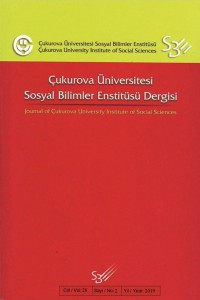Öz
The purpose of this study is to find out the strategies that
EFL instructors apply to cope with undesirable behaviors of language learners
at the tertiary level. The study
was conducted with 20 EFL instructors working in the preparatory school at a university
in 2017-2018 academic years. The data was gathered through a survey including
10 open-ended questions. Content analysis technique was used to assess the data.
The results of the study reveal that EFL instructors apply 12 coping strategies
towards the undesirable behaviors of language learners at tertiary level. The instructors use body language, verbal and facial expressions to warn
their students. In addition, keeping silent, asking
a question, finding out the reason of the undesirable behavior and the needs of
the disruptive students, raising awareness, increasing motivation, talking in
person, attracting attention, and ignoring the undesirable behavior are the
other coping strategies.
Anahtar Kelimeler
Kaynakça
- References Altıok, E. (2013, November 24). Sınıfta istenmeyen davranışlar. Retrieved from Prezi: https://prezi.com/mz0ij8t_mhrb/snfta-istenmeyen-davranslar/ Güleç, S., & Alkış, S. (2004). Öğretmenlerin sınıf ortamında kullandıkları davranış değiştirme stratejileri. Uludağ Üniversitesi, Eğitim Fakültesi Dergisi, 17(2), 247-266. Key, J. P. (1997). Descriptive research. Oklahoma State University Retrieved from: https://www.okstate.edu Kuhlenschmidt, S. L., & Layne, L. E. (1999). Strategies for dealing with difficult behavior. New Directions for Teaching and Learning, 77 Marciniak, A. (2015). Effective ways of dealing with discipline problems when teaching adolescent learners. World Scientific News, (7), 53-72 Merç, A., & Subaşı, G. (2015). Classroom management problems and coping strategies of Turkish student EFL teachers. Turkish Online Journal of Qualitative Inquiry, 6(1) Özben, Ş. (2010). Teachers’ strategies to cope with student misbehavior. Science Direct, 2(2), 587-594 Pala, A. (2005). Sınıfta istenmeyen öğrenci davranişlarini önlemeye dönük disiplin modelleri. Manas Journal of Social Studies, 13(7), 427 Sadık, F., & Doğanay, A. (2007). Sınıf içi istenmeyen davranışlarla ilgili öğretmen, öğrenci ve veli görüşlerinin karşılaştırılması. Çukurova Üniversitesi Sosyal BilimlerEnstitüsü Dergisi, 16(1), 539-560 Taylor, S. E., Pham L. B., Rivkin I. D., & Armor D. A. (1998) Mental Simulation, Self-Regulation, and Coping. American Psychologist, 53(4), 429 439 Taylor, S. E., & Stanton, A. L. (2007). Coping resources, coping processes, and mental health. The Annual Review of Clinical Psychology, 3, 377–401 Teyfur, M. (2015). Undesirable student behaviors encountered by primary school teachers and solution proposals. Academic Journals, 10(17), 2422-2432 Yılmaz, S., & Şahinkaya, N. (2010). The relationship between the methods teachers use against the misbehaviour performed in the classroom and emphatic tendencies of teachers. Procedia Social and Behavioral Sciences, 2, 2932–2936
Ayrıntılar
| Birincil Dil | İngilizce |
|---|---|
| Bölüm | Makaleler |
| Yazarlar | |
| Yayımlanma Tarihi | 15 Ekim 2019 |
| Gönderilme Tarihi | 11 Mart 2019 |
| Yayımlandığı Sayı | Yıl 2019 Cilt: 28 Sayı: 2 |


